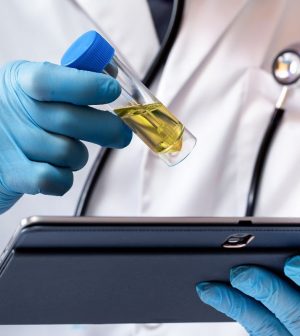- Could Your Grocery Store Meat Be Causing Recurring UTIs?
- Are You Making This Expensive Thermostat Error This Winter?
- Recognizing the Signs of Hypothyroidism
- 10 Strategies to Overcome Insomnia
- Could Artificial Sweeteners Be Aging the Brain Faster?
- Techniques for Soothing Your Nervous System
- Does the Water in Your House Smell Funny? Here’s Why
- Can a Daily Dose of Apple Cider Vinegar Actually Aid Weight Loss?
- 6 Health Beverages That Can Actually Spike Your Blood Sugar
- Treatment Options for Social Anxiety Disorder
Noninvasive Urine Test for Cervical Cancer Shows Promise

A new urine test might help doctors more easily screen for cervical cancer, researchers report.
The test looks for proteins generated by a type of cancer-causing human papillomavirus, HPV 16.
HPV strains 16 and 18 are responsible for nearly all cervical cancers, according to the National Cancer Institute.
These proteins, called E7 proteins, are associated with a high risk of cervical cancer, researchers said.
“Our new urine test can detect HPV16 E7 proteins, which are critical markers of cervical cancer risk, at extremely low levels,” said lead researcher Etsuro Ito, a professor of biology at Waseda University in Japan. “This means that women may be able to screen for cervical cancer without the discomfort and inconvenience of a traditional Pap test.”
The test detected E7 proteins in 80% of women with Stage 1 cervical intraepithelial neoplasia (CIN), a precursor to cervical cancer.
It also found the proteins in 71% of women with Stage 2 CIN and 38% of women with Stage 3 CIN, results show.
“We believe that the E7 oncoprotein is critical in the early stages of HPV-related cervical carcinogenesis and E7 may play a more significant role in the progression of CIN1 and CIN2 than in CIN3,” Ito said in a university news release.
The availability of a simple urine test could aid efforts to eradicate cervical cancer by eliminating barriers related to screening, researchers said.
“This new method holds great promise for early detection and prevention of cervical cancer,” Ito said. “We are optimistic that further development and validation of this assay will lead to its widespread use in clinical settings.”
The study was recently published in the journal Microorganisms.
More information
The National Cancer Institute has more on HPV and cancer.
SOURCE: Waseda University, news release, July 8, 2024
Source: HealthDay
Copyright © 2026 HealthDay. All rights reserved.










